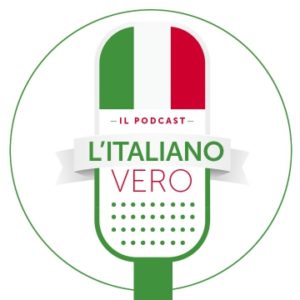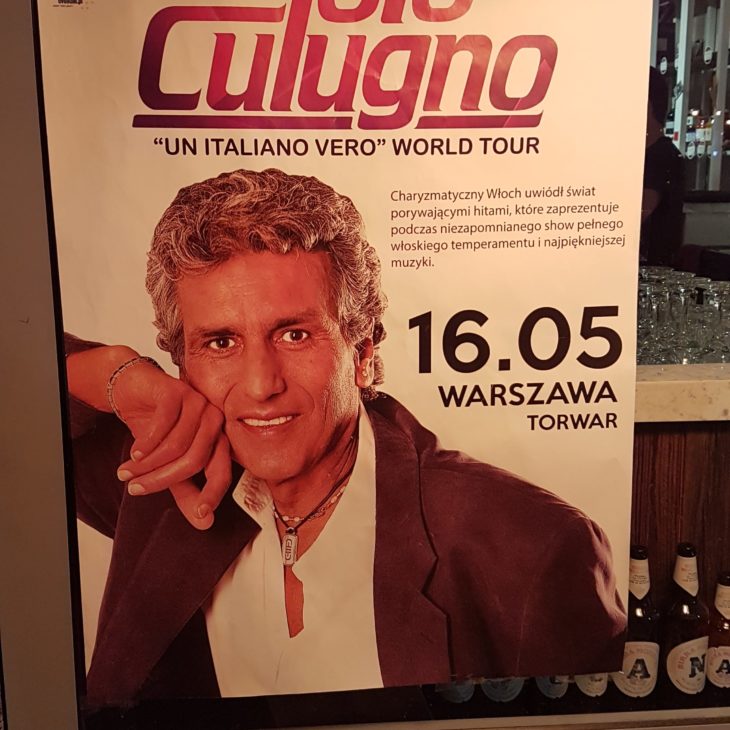Blog in italiano
In questo episodio Massimo e Mario (l’ombra dell’immagine di copertina del sito) continuano quanto iniziato nell’episodio EPISODIO 00 – Parliamo del più e del meno ad insegnarci a fare lo spelling usando i nomi delle città italiane.
Quizlet della puntata: https://quizlet.com/360851007/lo-spelling-in-italiano-flash-cards/
Mario si accorge che Massimo sta registrando con la televisione accesa, sintonizzata sul Festival di Sanremo. Il Festival della canzone italiana, o più comunemente Festival di Sanremo o anche semplicemente Sanremo è uno degli show più famosi della televisione Italiana, infatti quella che sta andando in onda è 69° edizione. E’ uno show che nel bene o nel male (è spesso fonte di gossip) fa sempre parlare di se gli italiani. Da “Sanremo” è uscita vincitrice nel 1958 la canzone “Nel blu dipinto di blu” nota anche come “Volare” di Domenico Modugno, diventata una delle canzoni italiane più famose al mondo. Al Festival nel 1983 è stata anche presentata la canzone di Toto Cutugno L’Italiano nota anche come L’Italiano vero, titolo che ha ispirato il nome del nostro podcast. La canzone arrivò quinta in classifica ma anche lei è ora considerata una delle canzoni più famose al mondo.
Come anticipato nel blog dell’episodio precedente Massimo viene richiamato per aver usato il sostantivo persona per “persona storica” invece che “personaggio storico”. Massimo fa notare che però, soprattutto nel parlare una lingua straniera, non bisogna aver timore di commettere errori, l’importante è usare la lingua per entrare in comunicazione e anche se la sensazione può’ essere differente non si viene mai giudicati per non parlare sufficientemente bene, anzi è il contrario, viene apprezzato lo sforzo di comunicare. Il motto che riassume bene questo concetto è quello del podcast preferito di Massimo “All Ears English” “connection not perfection”.
L’episodio procede poi con le città che vengono usate per fare lo spelling, partendo dalla famosa “M di Milano”, passando dalla meno conosciuta O di Otranto (che viene scoperto cercando su Google, essere il comune più orientale d’Italia), la P di Palermo sede di riprese del famoso film di Roberto Benigni, Johnny Stecchino, la T di Torino che essendo anche stata la prima capitale d’Italia è una città splendida che merita sicuramente una visita. Famosissime sono le sue regge, la Venaria Reale e la Palazzina di caccia di Stupinigi, oltre al museo egizio e gli innumerevoli monumenti, piazze e parchi.
Massimo consiglia di visitare la Costiera Amalfitana, a suo parere uno dei posti più belli e caratteristici d’Italia, e anche per lo scrittore Giovanni Boccaccio che così la descrive nel Decamerone- II giornata, IV novella :
«(…) Credesi che la marina da Reggio a Gaeta sia quasi la più dilettevole parte d’Italia; nella quale assai presso a Salerno e una costa sopra ‘l mare riguardante, la quale gli abitanti chiamano la costa d’Amalfi, piena di piccole città, di giardini e di fontane, e d’uomini ricchi e procaccianti in atto di mercatantia sì come alcuni altri. (…)»
Mario fa presente che anche Napoli per la sua bellezza è un posto da visitare è talmente bello che c’è questo detto: “Vedi Napoli e poi muori”. Massimo consiglia di vedere a proposito i tredici episodi della serie Dolce Vita dedicati alla città da David Rocco.
Massimo parlando delle città usa anche il modo di dire “fare una capatina” che si intende “fare una breve visita.
Ovviamente ci sono delle eccezioni, e per alcune lettere non vengono usate le città per fare lo spelling soprattutto per quelle lettere che non compongono l’alfabeto italiano come:
- la W “v doppia” o “doppia v” di Washington
- la X “ics”
- la Y “i greca” di York
E altre lettere per cui non esistono città italiane come:
- la Q di quadro
- la Z di Zara
La puntata si conclude con il sottofondo del festival di Sanremo che solitamente tiene “incollati al televisore” gli italiani fino a tarda notte.
Blog in English
In this episode, Massimo and Mario (Mario is the gost on the cover of the home page) continue their conversation from the EPISODIO 00 – Parliamo del più e del meno (Let’s talk about this and that) to teach us about how do the spelling using the names of Italian Cities.
Here is the Quizlet flashcards.
Mario realized that Massimo was recording with the television on: he was listening to the Sanremo Festival. It is a festival of Italian music, featuring one of the most famous shows in Italian television, currently in its 69th year. It is a show that, nel bene o nel male (for better or worse), is often a source of gossip, as Italians always talk about themselves. From “Sanremo” the winner in 1958 was the song, “Nel blu dipinto di blu” (“in the blue painted blue”), also known as “Volare” by Domenico Modugno; it later became one of the most famous Italian songs in the world. During the 1983 festival, Toto Cutugno’s song was presented, “L’Italiano,” also known as “L’Italiano Vero” (“The True Italian”), which inspired the name of our podcast. The song came fifth in the charts, but now it is considered one of the most famous songs in the world.
In the last blog we mentioned the previous episode when Massimo used the noun person for ““persona storica” (historical person) instead of a “personaggio storico” (historical character).” Massimo pointed out, however, that, especially when speaking a foreign language, you should not be afraid of making mistakes. The important thing is to use the language to communicate. Even if you don’t feel confident, just remember, you won’t’ be judged, and that the effort to communicate is appreciated. The motto that sums up this concept well is Massimo’s favorite podcast: All Ears English. It’s “connection not perfection” that matters.
The episode then returns to Massimo and Mario’s conversation about city spellings, starting with the famous “M” of Milan, passing on to the lesser known “O” of Otranto (the easternmost city of Italy), then it is “P” for Palermo, famous for Roberto Benigni’s movie and Johnny Stecchino. Finally, there is “T” for Turin, which was the first Italian capital.
Massimo recommended visiting the Amalfi Coast (Costiera Amalfitana), which is, in his opinion, one of the most beautiful and characteristic places in Italy. The writer, Giovanni Boccaccio, who describes it in the Decameron, Day II, IV:
«(…) I believed that the marina from Reggio to Gaeta is almost the most delightful part of Italy (“la più dilettevole parte d’Italia”); in which very near to Salerno and a coast over the sea concerning, which the inhabitants call the coast of Amalfi, full of small cities, gardens and fountains, and rich men and procaccantos in the act of haberdashery like some other. (…) “
Mario pointed out that Naples is also a lovely spot to visit. It is so beautiful there that they have a saying: “Vedi Napoli e poi muori” (“See Naples and then die”). Massimo advised to see about 13 episodes of the series Dolce Vita, which is dedicated to the city by David Rocco.
Even Turin, the first capital of Italy, is a splendid city that is worth visiting. There are many famous palaces, like the la Venaria Reale e la Palazzina di caccia di Stupinigi, as well as the Egyptian museum, and the countless monuments, squares, and parks.
When speaking of the cities, Massimo uses the expression “fare una capatina” or “take a look,” which can be better translated as “to make a brief visit.”
There are, of course, exceptions, and for some letters, there are no cities that can be used as examples. There are some letters that do not make up l’alfabeto italiano (the Italian alphabet):
- W — pronounced as “v doppia” or “doppia v,” as in Washington
- X — pronounced as“ics”
- Y — pronounced as“i greca,” as in York
And then, there are some letters that do not have an Italian cities, such as:
- Q, as in “quadro”
- Z, as in “Zara”
The episode ends with the background of the Sanremo Festival, which usually keeps Italians “incollati al televisore” (“glued to the television”) late into the night.
 Settembre 9, 2019
Settembre 9, 2019 24 min
24 min Luglio 29, 2019
Luglio 29, 2019 13 min
13 min Luglio 15, 2019
Luglio 15, 2019 24 min
24 min Luglio 1, 2019
Luglio 1, 2019 15 min
15 min Giugno 17, 2019
Giugno 17, 2019 21 min
21 min Maggio 30, 2019
Maggio 30, 2019 29 min
29 min Maggio 9, 2019
Maggio 9, 2019 21 min
21 min Aprile 30, 2019
Aprile 30, 2019 28 min
28 min Aprile 17, 2019
Aprile 17, 2019 15 min
15 min Aprile 10, 2019
Aprile 10, 2019 24 min
24 min Aprile 3, 2019
Aprile 3, 2019 24 min
24 min Gennaio 26, 2020
Gennaio 26, 2020 21 min
21 min Gennaio 12, 2020
Gennaio 12, 2020 20 min
20 min Dicembre 29, 2019
Dicembre 29, 2019 24 min
24 min Dicembre 15, 2019
Dicembre 15, 2019 21 min
21 min Dicembre 1, 2019
Dicembre 1, 2019 12 min
12 min Novembre 17, 2019
Novembre 17, 2019 min
min Novembre 3, 2019
Novembre 3, 2019 20 min
20 min Ottobre 20, 2019
Ottobre 20, 2019 14 min
14 min Ottobre 7, 2019
Ottobre 7, 2019 9 min
9 min Settembre 23, 2019
Settembre 23, 2019 33 min
33 min Gennaio 9, 2024
Gennaio 9, 2024 6 min
6 min Dicembre 2, 2022
Dicembre 2, 2022 31 min
31 min Ottobre 8, 2022
Ottobre 8, 2022 18 min
18 min Dicembre 25, 2021
Dicembre 25, 2021 1 min
1 min Settembre 18, 2021
Settembre 18, 2021 21 min
21 min Agosto 14, 2021
Agosto 14, 2021 17 min
17 min Maggio 4, 2020
Maggio 4, 2020 32 min
32 min Aprile 12, 2020
Aprile 12, 2020 41 min
41 min Agosto 26, 2019
Agosto 26, 2019 18 min
18 min Agosto 12, 2019
Agosto 12, 2019 11 min
11 min Giugno 5, 2019
Giugno 5, 2019 9 min
9 min






Leave a Comment